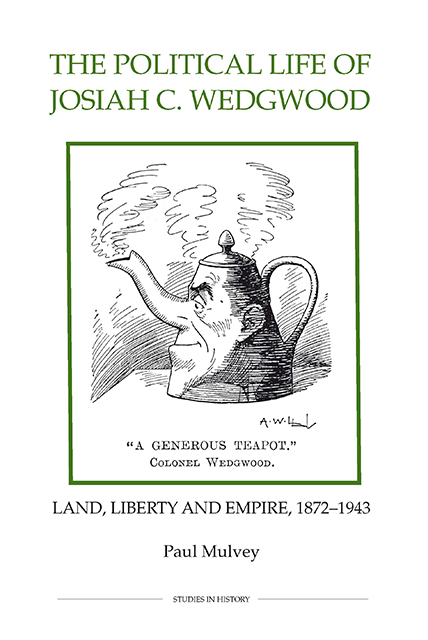Conclusion
Published online by Cambridge University Press: 02 March 2023
Summary
Josiah Wedgwood held none of the great offices of state, he never led a party, nor did he introduce a major piece of legislation. His career, however, spanned the great institutional and ideological shifts of British politics in the first half of the twentieth century, and he was an active participant in both. Wedgwood was a radical in the broad sense defined by the 1911 Encyclopaedia Britannica as a politician who desires ‘to make thorough, or radical, changes in the constitution and in the social order generally’. He was also a Radical in the narrower and more self-conscious sense that he adhered to a political version of British Liberalism that called itself Radicalism. This creed had its emotional roots in the English dissenting tradition which stretched back to the Puritans, and its philosophical basis in the small-government, freetrading internationalism of Richard Cobden. For Wedgwood and his like it found its highest expression in the free-land utopianism of Henry George. To some extent it was a creed in the true sense of the word. It could replace religion for men like Wedgwood who had become sceptical of the supernatural, or be a manifestation of God's vision for mankind for those, like the Nonconformists, who had retained their faith in the Almighty. In either event, the tenets of Radicalism – whether it was free trade for pretty much all Radicals, or ‘free land’ for some – were to a considerable extent viewed as matters of morality and faith. They were regarded not as merely pragmatic policy choices but as universal and self-evident truths. As such, their advocates were prepared to fight long and hard for them, albeit sometimes with a moral self-righteousness that went up to and beyond the point of bigotry against those whom they knew or suspected to hold a different ‘faith’.
Wedgwood was an archetypal and self-conscious Radical. Temperamentally rebellious, frequently poorly prepared, often short-tempered, he was infuriating yet endearing, for his humour and charm matched his aggression and hyperbole. Like all active politicians, his career manifested many inconsistencies and hypocrisies, yet throughout his long and active political life there flowed a consistent stream of Radical ideology to which he always returned, even when, as towards the end of his career, it seemed to have lost most of its public support.
- Type
- Chapter
- Information
- The Political Life of Josiah C. WedgwoodLand, Liberty and Empire, 1872-1943, pp. 202 - 208Publisher: Boydell & BrewerPrint publication year: 2010



